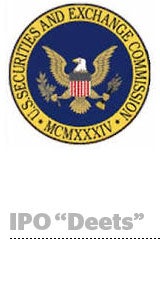 French retargeting specialist Criteo has been planning its IPO filing for the better part of a year and it’s finally taking the plunge.
French retargeting specialist Criteo has been planning its IPO filing for the better part of a year and it’s finally taking the plunge.
The company filed an F-1 with the Securities and Exchange Commission that details its financial performance and other particulars about its business. The company hopes to raise $190 million from the stock sale, though the filing doesn’t say how many shares will be made available to investors. The company is aiming for a valuation of around $2 billion, Bloomberg reported, citing an unidentified source.
The F-1 (as opposed to an S-1, which is for domestic companies) comes a few days ahead of Rocket Fuel’s IPO. That offering is expected to hit Nasdaq on Friday and Rocket Fuel is hoping to raise $108 million or more on the issuing of 4 million shares of stock. Like Rocket Fuel — and the other two big ad-tech IPOs in the last three months, Tremor Video and YuMe — Criteo’s financial record the past year has been mixed.
But the capital infusion from its IPO could help boost Criteo’s competitiveness. The F-1 notes the company competes with giants like Google, Amazon and eBay, along with ValueClick and “smaller, privately held companies,” presumably among them TellApart and Sociomantic.
Criteo plans to use the proceeds from the stock sale for general business operations. It has been working to expand its geographical footprint globally, particularly in the US — where it would appear President Greg Coleman has succeeded in driving revenue growth. The growth outside of Criteo’s native France has been steady since 2010, when foreign sales figures represented 56.7% of total revenues. Over 2011, 2012 and 2013, the percentage of revenues from places other than France have been 70.9%, 81.9% and 85.7%, respectively.
While Criteo has generally been viewed as a retargeting services provider, the words don’t appear in the F-1 filing. For the past year, executives have considered that definition too narrow — and probably too “inside ad tech” to mean much to potential investors. Instead, the company has used the F-1 to describe itself as an ecommerce player that “leverages large volumes of data.” That’s language that Wall Street can readily appreciate.
Also from the F-1, Criteo disclosed the price it paid for mobile analytics firm Ad-X two months ago. It shelled out 9.3 million euros, or US$12.4 million. At the time of that deal, Ad-X had 120-plus customers, including eBay, Expedia and Priceline.com.
On inventory supply, the F-1 revealed that Criteo sent checks to AppNexus and Google representing 30% of its cost of revenue. The company bids through all the big players, including Yahoo’s Right Media, Facebook Exchange, Appnexus, Admeld, the Rubicon Project and PubMatic. And direct-to-publisher relationships are also important.
No surprise: Criteo is heavily fueled by ecommerce, including primarily retail companies but also travel and classifieds. From the F-1, “In 2010, 2011 and 2012 and in the six months ended June 30, 2013, 72.3%, 68.2%, 66.0% and 63.5%, respectively, of our revenue was derived from advertisements placed for retail ecommerce businesses.”
Criteo posted a net profit of $1.3 million in 2012, a 78% drop from $8.1 million in profits in 2011. On the plus side, 2012 revenues were $353.7 million, a gain of 89% of 2011 revenues.












